Effective Strategies for Squirrel Control: Keeping Your Garden Squirrel-Free
- April 5, 2024
- 0 comment
Gardeners often face the challenge of protecting their beloved plants from squirrels. While these agile creatures can be delightful to watch, they can wreak havoc in a garden, digging up bulbs, nibbling on fruits, and generally causing damage. This article explores effective and humane strategies to keep squirrels out of your garden.
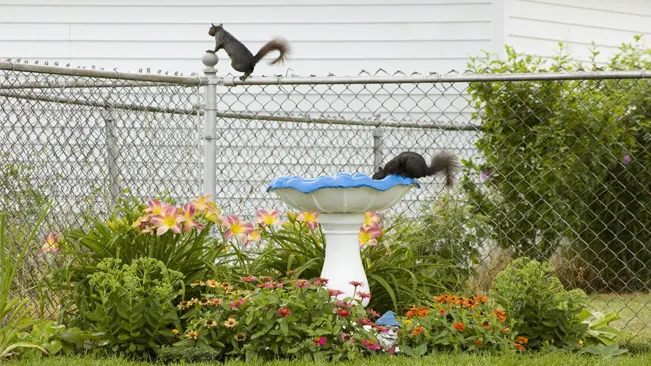
Understanding Squirrel Behavior
To effectively deter squirrels, it’s essential to understand their behavior. Squirrels are primarily attracted to gardens for food and shelter. They are particularly fond of fruits, nuts, seeds, and bulbs. Additionally, they often dig in the soil to bury or retrieve nuts, which can disrupt plant roots.
Squirrel Behavior and Garden Attractions
- Foraging Habits
- Squirrels are primarily foragers. They are constantly in search of food, which primarily includes nuts, seeds, fruits, and even flowers. Gardens, with their abundance of edible plants and seeds, are naturally attractive to them.
- Food Preferences:
- While they are not particularly fussy eaters, squirrels have a strong preference for certain garden items like tomatoes, berries, corn, and sunflower seeds. They are also attracted to young, tender plants and buds.
- Nesting Preferences:
- Squirrels use materials like twigs, leaves, and grass to build their nests. Gardens often provide these materials in abundance, making them appealing sites for squirrels to settle.
- Digging and Burying Behavior:
- A common behavior of squirrels that impacts gardens is their habit of digging and burying food, particularly nuts. This behavior, known as caching, is how they store food for later consumption. In the process of doing this, they can uproot plants and damage the garden.
- Seasonal Behavior:
- Squirrel activity in gardens can vary with the seasons. For instance, in late summer and fall, they are actively collecting and storing food for the winter, which can increase their presence and activity in gardens.
- Territoriality and Survival Instincts:
- Squirrels are territorial animals. Once they find a good food source, like a garden, they are likely to return regularly. Their survival instincts also make them quite bold and persistent, which can make them challenging to deter.
- Adaptability:
- Squirrels are highly adaptable creatures. They quickly learn to overcome simple obstacles and can become accustomed to deterrents if not varied regularly.
Use of Physical Barriers in Squirrel Deterrence
Netting and Fencing
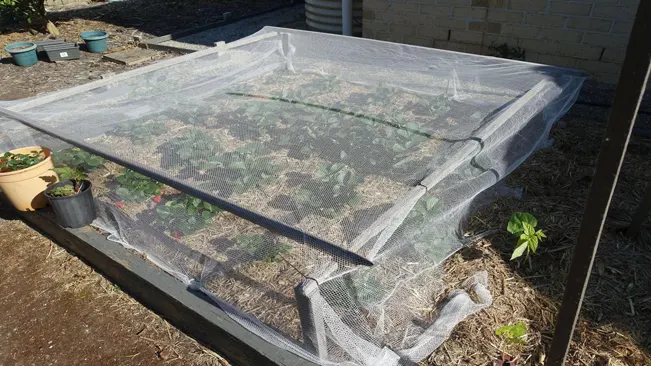
- Purpose: The primary function of using netting and fencing is to create a physical barrier that prevents squirrels from accessing your plants and vegetables. This method is effective because it hinders the squirrel’s ability to reach the plants, rather than deterring them with scents or tastes.
- Designing a Squirrel-Proof Fence
- Height: A fence should be at least a few feet high to be effective. Squirrels are adept jumpers, so a height of around 4-6 feet is recommended.
- Material: The fence can be made from various materials, including wood, plastic, or metal. The key is to ensure that the gaps are small enough to prevent squirrels from squeezing through.
- Floppy Top: Adding a floppy, outward-angled top to the fence can be very effective. Squirrels find it difficult to navigate overhangs, so this feature can prevent them from climbing over the top of the fence.
- Netting
- Usage: Netting is particularly useful for covering individual plants, raised beds, or small areas. It’s ideal for protecting seedlings, fruits, and vegetables.
- Material: Garden netting is typically made of nylon or plastic and comes in various mesh sizes. Choose a mesh small enough to prevent squirrels from getting through.
- Installation: Properly secure the netting around the plants or beds. It’s important to ensure there are no gaps for squirrels to slip through.
Cylinder Guards
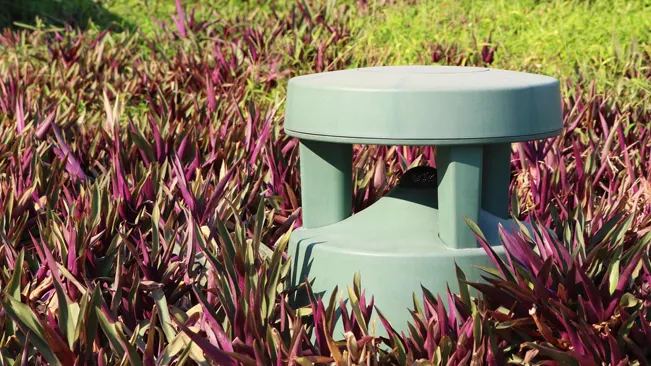
- Function: Cylinder guards are designed to prevent squirrels from climbing trees or poles, like those used for bird feeders. They act as a physical barrier that squirrels cannot easily grip or climb.
- Design and Installation:
- Material: These are usually made from smooth metal or heavy-duty plastic.
- Size: The diameter of the cylinder should be large enough to prevent squirrels from reaching around it. Typically, a diameter of 6-8 inches is effective.
- Height: The guard should be placed high enough on the tree or pole so that squirrels can’t jump over it. Placing it at least 5 feet off the ground is advisable.
- Securing: Ensure that the guard is securely fastened so it doesn’t slip or tilt, which would allow squirrels to bypass it.
Employing Scent and Taste Deterrents to Deter Squirrel
Natural Repellents
Peppermint Oil
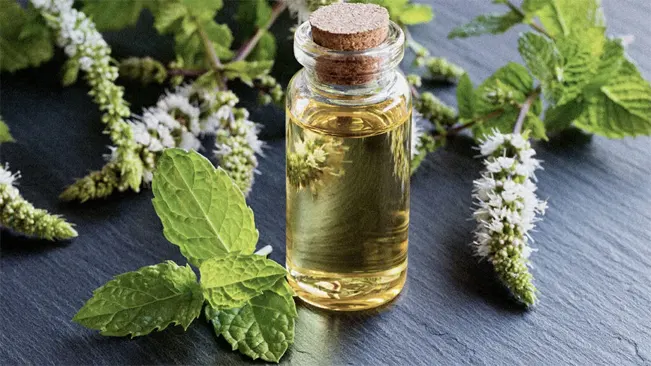
- How it Works: Squirrels are repelled by the strong scent of peppermint. The oil masks the smells of fruits and nuts that typically attract them.
- Application: Soak cotton balls in peppermint oil and distribute them around the garden, especially near plants that are most vulnerable. You can also mix peppermint oil with water in a spray bottle and spritz around the garden.
Cayenne Pepper
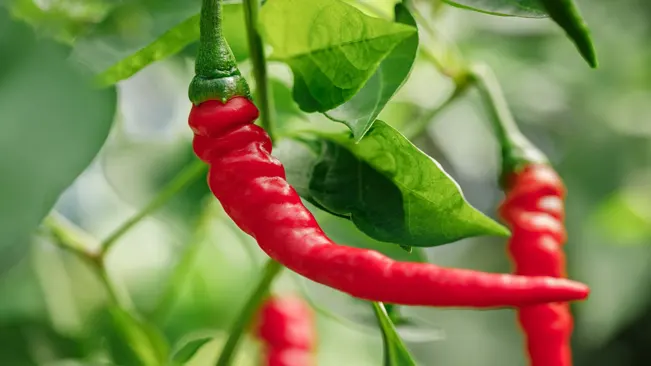
- How it Works: The capsaicin in cayenne pepper is an irritant to squirrels. This discourages them from eating plants and digging in the garden.
- Application: Sprinkle cayenne pepper powder around the base of plants, or make a spray using cayenne pepper, water, and a small amount of dish soap to help it adhere to plant surfaces.
Garlic
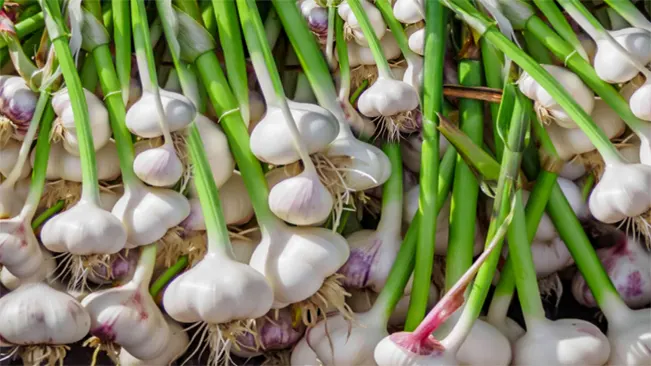
- How it Works: Garlic’s pungent smell is off-putting to squirrels.
- Application: Crush garlic cloves and mix with water for a spray, or intersperse garlic plants in your garden.
Commercial Repellents
- Types of Commercial Repellents
- There are various types of commercial repellents, including sprays, granules, and electronic devices that emit ultrasonic waves. Sprays and granules often contain natural ingredients like predator urine, garlic, or capsaicin.
- How to Use
- Read Instructions: Always read the manufacturer’s instructions carefully. This ensures correct usage and safety.
- Regular Application: Repellents often need reapplication, especially after rain or watering.
- Safety: Ensure the repellents are safe for use around children, pets, and beneficial wildlife.
- Effectiveness
- The effectiveness of commercial repellents can vary. They often work best when combined with other deterrent methods, like physical barriers.
Modify Your Garden Layout to Deter Squirrels
The layout and maintenance of your garden can significantly influence its attractiveness to squirrels. By making a few strategic changes, you can create an environment that’s less appealing to these creatures.
Remove Attractants
- Regular Cleaning: Frequently inspect your garden and remove any fallen fruits, nuts, or seeds. These are primary attractants for squirrels. By keeping the ground clear, you reduce the food sources that lure them into your garden.
- Secure Compost Bins: If you have compost bins, ensure they are well-secured. Squirrels are attracted to compost bins if they can easily access food scraps.
- Harvest Timely: Promptly harvest ripe fruits and vegetables. Overripe or fallen produce is a delicacy for squirrels.
Intersperse Plantings
- Using Strong-Scented Plants: The use of plants like garlic and marigolds throughout your garden can be a natural deterrent. Squirrels dislike the strong scent of these plants. By integrating them into your garden, you create a scent barrier that’s unpleasant for squirrels.
- Strategic Planting: Place these deterrent plants near more vulnerable plants, like fruit trees or vegetable beds. This proximity can enhance the protective effect.
- Diversity in Planting: A diverse garden can sometimes confuse and deter pests. Mix up your planting patterns so that it’s less straightforward for squirrels to navigate and locate their preferred food sources.
- Bulb Protection: For bulb plants, consider planting daffodils, which are known to be unattractive to squirrels. Planting them around or among more susceptible bulbs can offer a degree of protection.
Decoys and Distractions: An Effective Strategy
Decoy Predators
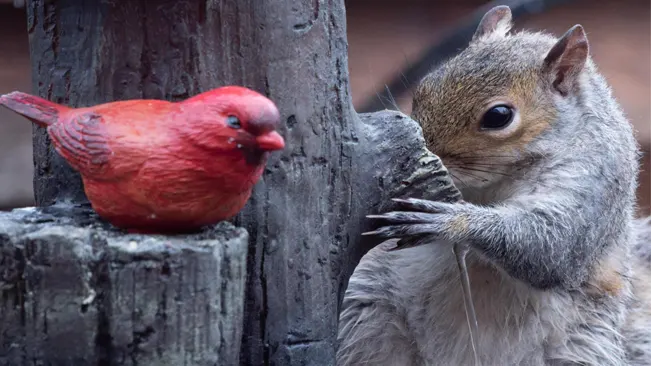
- How They Work: Decoy predators work on the principle of mimicking the presence of a predator. Squirrels, being prey animals, are naturally cautious and tend to avoid areas where they sense danger.
- Types of Decoys: Common decoys include models of owls, hawks, and snakes. These are predators that squirrels instinctively fear.
- Placement and Movement: It’s crucial to place these decoys in visible areas where squirrels are likely to see them. However, squirrels are intelligent and may eventually realize that the decoys are not a real threat. To counter this, regularly move the decoys to different locations in the garden. This change in position helps maintain the illusion of a real threat.
- Enhancing Realism: Some decoys come with additional features like sound, motion, or reflective eyes to enhance realism. These can be more effective but might also require batteries or solar power.
Feeding Stations
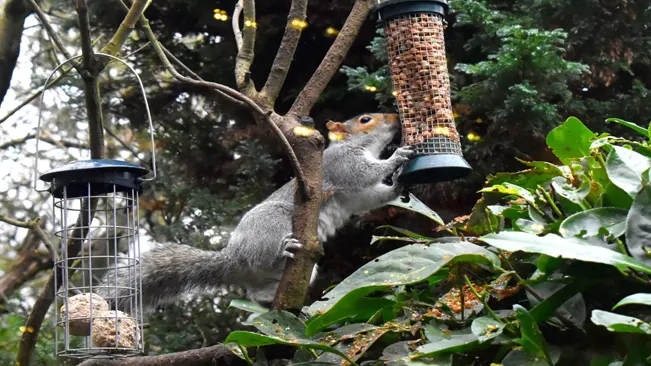
- Principle of Distraction: The idea behind a feeding station is to distract squirrels by providing an alternative food source, drawing them away from the garden.
- Location: Set up the feeding station at a considerable distance from your garden. The closer it is to the garden, the more likely squirrels will venture into your plants.
- Feeding Choices: Common foods for squirrels include nuts, seeds, and fruits. It’s important to note that while this can distract squirrels, it may also attract more of them to your vicinity.
- Management: Regularly replenish the food at these stations. An empty feeding station won’t be effective in distracting squirrels. Also, ensure that the feeding area is tidy to avoid attracting rodents or other unwanted animals.
Regular Maintenance
Routine Checks
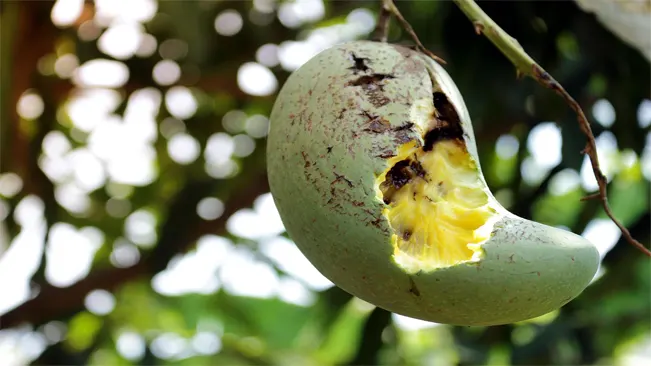
- Purpose: Regular inspections of your garden are crucial for early detection of squirrel activity. This proactive approach allows you to identify and address potential problems before they escalate.
- What to Look For: Signs of squirrel activity include small holes in the ground where they may have buried nuts, bite marks on fruits or vegetables, disturbed soil, and chewed plants or bulbs. Also, look for any new pathways or trails in the garden that squirrels might be using.
- Frequency: The frequency of these checks depends on the level of squirrel activity in your area. In high-activity zones, checking daily or every other day is advisable. In areas with less activity, a weekly check might suffice.
- Follow-Up Actions: If you notice signs of squirrels, reinforce deterrents like repellents or barriers. Replace or repair any damaged or ineffective deterrents immediately.
Garden Clean-Up
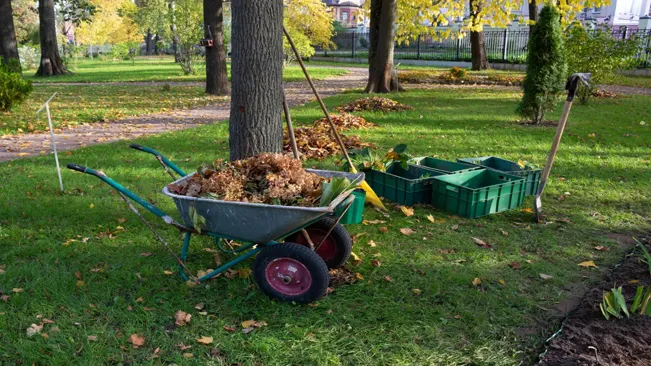
- Purpose: A clean and well-maintained garden is less attractive to squirrels. It reduces hiding spots and food sources that may attract them.
- Removing Debris: Regularly remove fallen fruits, nuts, and branches. These can attract squirrels seeking food. Keeping the ground clear can also make it easier to spot signs of squirrel activity.
- Managing Vegetation: Overgrown bushes, tall grasses, and dense vegetation provide ideal hiding and nesting spots for squirrels. Keeping your garden well-trimmed and orderly can discourage squirrels from settling in.
- Mulching and Covering Soil: Using mulch or landscape fabric can make it more difficult for squirrels to dig and bury nuts in your garden soil.
- Compost Management: If you have a compost bin, ensure it is secure and closed. Open compost piles can attract squirrels with food scraps.
- Tree and Shrub Maintenance: Trim tree branches that extend close to your house, fences, or bird feeders. This can prevent squirrels from using them as pathways into your garden.
Conclusion
Keeping squirrels out of the garden requires a combination of strategies tailored to your specific situation. While it might be impossible to completely eliminate them, employing these methods can significantly reduce their impact on your garden. Remember, the goal is to coexist with these creatures while protecting your garden, so always opt for humane solutions.
FAQs (Frequently Asked Questions)
- What are the most effective natural repellents for squirrels?
- Natural repellents like peppermint oil, cayenne pepper, and garlic are known to deter squirrels. Sprinkling crushed chili flakes or using a spray made with these ingredients can help keep squirrels at bay.
- Natural repellents like peppermint oil, cayenne pepper, and garlic are known to deter squirrels. Sprinkling crushed chili flakes or using a spray made with these ingredients can help keep squirrels at bay.
- Can physical barriers really prevent squirrels from entering the garden?
- Yes, physical barriers like fencing, especially those with a floppy top, and netting over plants can be quite effective. Cylinder guards around trees and bird feeders can also prevent squirrels from climbing.
- Yes, physical barriers like fencing, especially those with a floppy top, and netting over plants can be quite effective. Cylinder guards around trees and bird feeders can also prevent squirrels from climbing.
- Are there any plants that can deter squirrels?
- Squirrels tend to avoid strong-smelling plants like marigolds, garlic, and daffodils. Planting these around your garden can act as a natural deterrent.
- Squirrels tend to avoid strong-smelling plants like marigolds, garlic, and daffodils. Planting these around your garden can act as a natural deterrent.
- How does a decoy predator work in keeping squirrels away?
- Decoy predators like plastic owls or snakes can scare squirrels away. It’s important to move these decoys around periodically to maintain the illusion of a threat.
- Decoy predators like plastic owls or snakes can scare squirrels away. It’s important to move these decoys around periodically to maintain the illusion of a threat.
- Is it humane to use commercial repellents, and how effective are they?
- Most commercial repellents are designed to be humane, usually working by emitting a scent or taste that squirrels dislike. They can be effective but may need regular reapplication.
- Most commercial repellents are designed to be humane, usually working by emitting a scent or taste that squirrels dislike. They can be effective but may need regular reapplication.
- How often should I apply natural repellents?
- Natural repellents should be reapplied regularly, especially after rain or watering, as they can easily wash away.
- Natural repellents should be reapplied regularly, especially after rain or watering, as they can easily wash away.
- Can feeding squirrels in a different location keep them away from the garden?
- Providing an alternative food source at a distance from your garden can distract squirrels. However, this might also attract more squirrels to your area.
- Providing an alternative food source at a distance from your garden can distract squirrels. However, this might also attract more squirrels to your area.
- What are the best ways to squirrel-proof a bird feeder?
- Use squirrel-proof bird feeders or place cylinder guards around the poles. Keeping feeders away from trees or structures squirrels can jump from also helps.
- Use squirrel-proof bird feeders or place cylinder guards around the poles. Keeping feeders away from trees or structures squirrels can jump from also helps.
- How can I stop squirrels from digging up bulbs?
- Placing chicken wire or mesh over the soil where bulbs are planted can prevent squirrels from digging them up. Planting bulbs deeply can also deter squirrels.
- Placing chicken wire or mesh over the soil where bulbs are planted can prevent squirrels from digging them up. Planting bulbs deeply can also deter squirrels.
- Is it possible to completely eliminate squirrels from my garden?
- It’s very challenging to completely eliminate squirrels, as they are agile and persistent. The goal is to deter them effectively to minimize damage to your garden.

Kristine Moore
Forestry AuthorI'm Kristine Moore, a seasoned garden landscaping professional with over 30 years of experience. My extensive career has been dedicated to transforming outdoor spaces into stunning, sustainable landscapes. With a deep understanding of horticulture, design principles, and environmental stewardship, I have become a respected figure in the field, known for creating harmonious, visually appealing, and eco-friendly gardens. My commitment to excellence and continuous learning in landscaping trends and techniques has solidified my reputation as an expert in garden design and implementation.




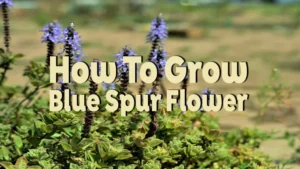







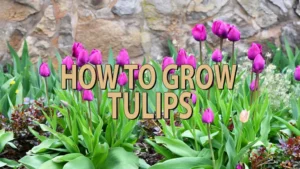
Leave your comment